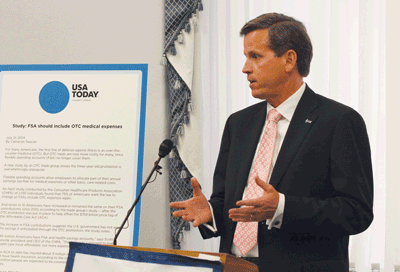Restoring OTC Eligibility For Health Savings Could Fly During Lame Duck Session
This article was originally published in The Pink Sheet Daily
Executive Summary
Rep. Barrow says congressional gridlock is blocking the Restoring Access to Medication Act, but there is hope for passage during the lame duck session. CHPA and self-care advocates discuss the need for the change and the value of OTCs during briefing marking International Self-Care Day.
The lame duck session in Congress will be the best chance this year to pass legislation to again allow consumers to buy OTC drugs using pre-tax savings accounts without first getting prescriptions, Rep. John Barrow says.
Continuous gridlock in Congress likely will block bipartisan, bicameral bills introducing the Restoring Access to Medication Act – H.R. 2835 and S. 1647 – from passing before the November elections, the Georgia Democrat said July 24 at a briefing on Capitol Hill hosted by the Consumer Healthcare Products Association.
Prescriptions have been needed to buy OTC drugs using flexible spending, health savings and health reimbursement accounts since the change imposed by a provision of the Affordable Care Act took effect in 2011 (Also see "In Brief: USPlabs drops aegeline, bill would allow FSA spending on OTCs, herbal ingredient research draws criticism, P&G supports toothpaste claims" - Pink Sheet, 11 Nov, 2013.).
Barrow, who co-sponsored H.R. 2835 with Rep. Lynn Jenkins, R-Kan., said legislators could be more willing to pass the bills following the November elections.
He said during the lame duck session, members who will be returning in 2015 will not be worried about how a vote to amend the ACA will affect their election chances, while those who will not return for the next session could see the legislation as their last chance to enact the change.
However, Barrow also offered as a “glimmer of hope” that “whatever prospects we have in the lame duck session is also something we have hope of doing in the next Congress.”
Legislation to remove the Rx requirement for buying OTCs with pre-tax savings accounts has failed in previous sessions since the ACA provision took effect and is one of CHPA’s top legislative goals this year (Also see "FSA/HSA Coverage Tops CHPA 2014 Legislative Goals" - Pink Sheet, 6 Jan, 2014.).
OTCs were made part of pre-tax savings account benefits because of the expected health care savings for consumers. But the ACA added the prescription requirement based on the argument that health care savings were not being realized from exclusively consumer-driven choices.

Rep. John Barrow and Merck executive Jim Mackey at a briefing on Capitol Hill to discuss the value of OTC medicines for reducing health care costs.
Consumer Healthcare Products Association
Amendment Is Necessary For Reducing Costs
CHPA President and CEO Scott Melville said the ACA provision changing how consumers make OTC purchases with HSAs and FSAs is “nonsensical” and is “a bad health care policy and bad economics.”
He said OTC medicines are one of the most cost-effective forms of health care and a key component of lowering overall health care costs, a driver for the ACA.

CHPA President and CEO Scott Melville talks about restoring OTC drug eligibility under tax-preferred savings accounts at a briefing on Capitol Hill.
Consumer Healthcare Products Association
Indeed, CHPA-funded research Booz & Co. published in 2012 shows for every $1 spent on OTC medicines, the U.S. health care system on the whole saves $7 in avoided costs, James Mackey, senior VP, U.S. region head, Merck Consumer Care, and CHPA chairman said at the briefing. The majority of these savings, $66 billion, comes from avoiding visits to health care providers, and the remaining $25 billion comes from consumers using lower-cost OTCs rather than more expensive prescription medicines, according to the report (Also see "CHPA Quantifies OTCs’ Overall Value To Promote Expanded Access" - Pink Sheet, 6 Feb, 2012.).
“That is more than $102 billion in savings per year,” enough to pay the annual tuition of almost 2 million medical students, he said.
Melville also noted the provision should be changed because HSAs and FSAs are “incredibly popular” and the fastest growing insurance model with current enrollment at 45 million – a number Mackey said will reach 62 million by the end of 2015.
Consumers are drawn to the accounts because they can take responsibility for their health care and budget at the same time, but their benefits from using the accounts are diminished by the ACA change.
“The ACA provision that imposes a doctor’s prescription for OTC medicines in order to be reimbursed, undermines the new health paradigm,” Mackey said. FSA and HSA users likely will need to take off work and spend money to visit physicians for prescriptions, raising their health care costs, he added.
Beyond the financial benefits of amending the provision, Melville said voters want to use FSAs and HSAs to pay for OTCs. He noted a recent survey by Nielsen found 74% of consumers wanted the provision changed.
He added he is hopeful that this “incredible amount of public opinion” and bipartisan support for the change will make it happen.
In addition to promoting the Restoring Access to Medication Act, CHPA hosted the briefing to mark International Self-Care Day, which “takes place on July 24, or 24/7 as it is known in many parts of the world, because it symbolically represents the convenience that self-care, including OTC medicines, provides to consumers across the globe seven days a week, 24 hours a day,” Melville said.
[Editor’s note: Each week, “The Pink Sheet” DAILY features a story from “The Tan Sheet”![]() highlighting a current topic in the consumer medicines or nutritional supplements sectors.]
highlighting a current topic in the consumer medicines or nutritional supplements sectors.]